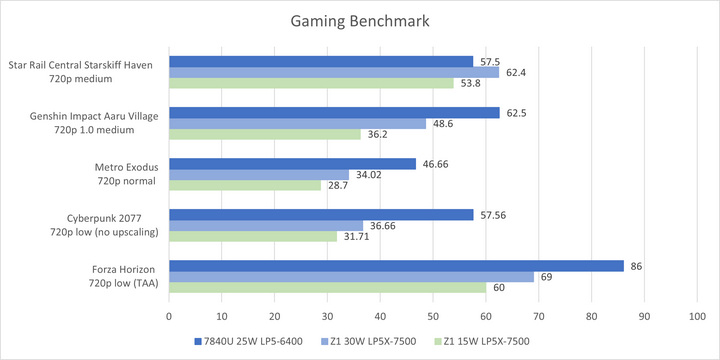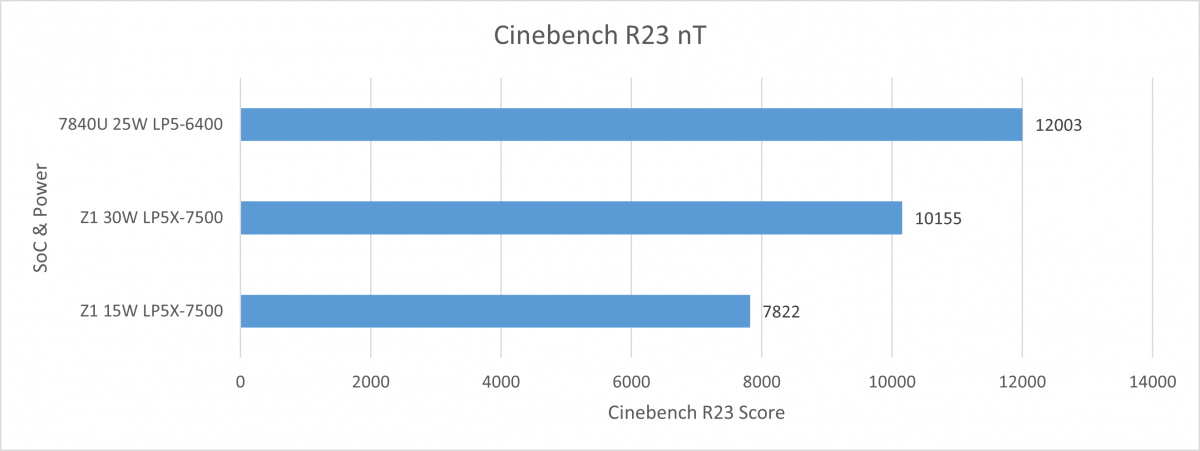AMD Ryzen Z1 CPU benchmarks leaked - and they look like good news for handheld gaming
Leaked performance analysis promise 15W of fun

Sign up for breaking news, reviews, opinion, top tech deals, and more.
You are now subscribed
Your newsletter sign-up was successful
A leaker on the Chinese discussion forum Zhihu has published a detailed performance analysis of AMD’s Ryzen Z1 processor - the little brother of the Z1 Extreme chip revealed earlier this year and seen in action in PC gaming handhelds such as the upcoming Lenovo Legion Go.
David Huang posted his findings on Zhihu, giving us a great deal of insight into how this chip will perform in relation to currently available gaming handhelds like the Valve Steam Deck, which runs on an older custom Zen 2 APU from AMD. He provided detailed specs and performance stats, including several game benchmarks, although we should caution that we can't verify that these are genuine results from the CPU.


Although Huang didn’t have a Z1 Extreme to hand for direct comparisons, he did compare performance to AMD's Ryzen 7 7840U laptop CPU that was revealed earlier this year. The 7840U was presumably chosen since it is broadly analogous to the Z1 Extreme chip in terms of overall specs (although actual performance varies, since the Z1 APUs are specifically designed to be used in handheld gaming devices).
As for the results? Well, they're a bit of a mixed bag. The standard Z1 obviously lags behind its Extreme counterpart in gaming performance, but it’s also a lot more power-efficient - offering a playable experience at 720p with just 15W of power consumption. Dialing up the available power draw to the chip’s maximum of 30W actually only provided a modest performance boost of less than 20% on average.
Naturally, the Z1 is expected to be a fair bit cheaper than the Z1 Extreme - although it won't be available to buy directly, so pricing will ultimately be determined by the third-party manufacturers using the chip.
An iPhone 15 Pro feature
Last year, my colleague John Loeffler published a piece about the potential of Apple’s M-series silicon for gaming in integrated graphics. While I respectfully disagreed with his stance about macOS becoming a gaming haven (OK, fine, I said I’d rather die than become a Mac gamer), John was absolutely right that processor-integrated graphics will be the way most of us play games in the future.
Consider, for a moment, the RTX 4090. Nvidia’s flagship desktop graphics card is an absolute monster, costing more than three PS5s and guzzling down up to 450W of power (without overclocking). That’s 30 times the maximum power consumption of the AMD Z1 running at 15W - and you’ll need some similarly power-hungry components in your PC to prevent your 4090 from bottlenecking, too.
Sign up for breaking news, reviews, opinion, top tech deals, and more.
In an era where electricity bills can be brutal (especially if, like me, you live in the UK right now), low-power gaming is immediately preferable. The push for gaming-capable iGPUs is only just beginning; now, every new generation from major players including AMD, Intel, and Apple brings impressive performance leaps. The other advantages are size and thermal performance; these chips can be comfortably squeezed into compact devices like gaming handhelds and the best ultrabooks.
Although there are no official details right now about devices that will use the Z1 chip, it’s very likely that currently available handhelds using the Z1 Extreme will see a cheaper variant pop up in the not-too-distant future. When I met with Lenovo in Berlin at IFA 2023, the staff were coy about the potential of a more affordable Legion Go, but all but confirmed that a Z1 model would arrive eventually.
Personally, I can’t wait - and I hope that AMD is planning a Z2 series to deliver even better gaming performance with the same low, low power draw. If only Microsoft could get their act together and give Windows 11 a proper handheld mode…
You might also like
- New Apple leak is bad news for MacBook fans – but there’s still hope for a new iMac
- Microsoft kills off Windows 11's troubleshooters - so where can you turn for help?
- iPhone 15 series: key upgrades at a glance

Christian is TechRadar’s UK-based Computing Editor. He came to us from Maximum PC magazine, where he fell in love with computer hardware and building PCs. He was a regular fixture amongst our freelance review team before making the jump to TechRadar, and can usually be found drooling over the latest high-end graphics card or gaming laptop before looking at his bank account balance and crying.
Christian is a keen campaigner for LGBTQ+ rights and the owner of a charming rescue dog named Lucy, having adopted her after he beat cancer in 2021. She keeps him fit and healthy through a combination of face-licking and long walks, and only occasionally barks at him to demand treats when he’s trying to work from home.